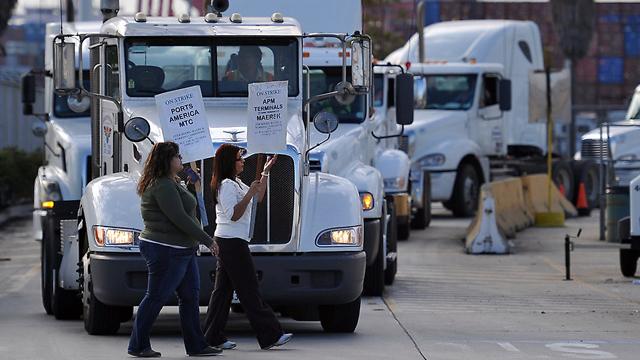
The largest terminal at the Port of Los Angeles and three terminals at the neighboring port of Long Beach were shut down as striking clerical workers, backed by longshoremen who refused to cross their picket lines, threatened to paralyze the nation's busiest port complex.
About 70 clerical workers struck the APM Terminals operations on Pier 400 at Port of Los Angeles, raising the ante in a 2 1/2-year-old contract battle over union claims that management has been outsourcing well-paid jobs out of state and overseas.
The strikers are from the Office Clerical Unit of the International Longshore and Warehouse Union's Local 63. Their contracts with 14 companies who operate most of the terminals at the twin ports expired in June 2010.
Years of contract renewal negotiations ended with talks breaking off on Monday, leading to the walkout that continued for its second day Wednesday.
Combined, Los Angeles and Long Beach comprise the nation's busiest port complex, handling $273 billion worth of cargo last year. Dockworkers honored the strikes of clerical workers at both ports.
LA port spokesman Phillip Sanfield said only two cargo ships were affected Tuesday, and the strike was far from crippling because there are other container terminals running.
Port of Long Beach spokesman Art Wong said Wednesday that about a quarter of a billion dollars in goods travel through the three shuttered container terminals there daily. Three other terminals remain open there.
An arbitrator ruled Tuesday night that the union was negotiating in bad faith with shippers and the strike was invalid. However, the order was ignored. A second arbitrator also was expected to rule within two days on whether to uphold that order.
Clerical workers held brief strikes in 2010 and 2011 that ended after arbitrators ruled them improper.
For now, however, "they're on strike and picket lines are being respected," said Craig Merrilees, an ILWU spokesman in San Francisco.
The union risks a "dangerous escalation" if they continue to ignore the order, said Stephen Berry, lead negotiator for the Los Angeles/Long Beach Harbor Employers Association, which represented the 14 terminal operators in contract talks.
As job actions spread to more terminals, shippers could, in turn, lock out employees, Berry said. A bitter 10-day lockout at a number of West Coast ports in 2002 caused an estimated $15 billion in losses.
At issue is the union's contention that terminal operators have outsourced jobs to lower-paid paperwork pushers in the U.S. and places such as Costa Rica, India and Taiwan. A union release contended that 51 clerical jobs have been lost in the past five years.
The negotiating group for the shippers denied that any local union clerical jobs were outsourced and said in a statement that the 51 workers had quit, died or retired with full benefits in the past three years.
Their positions weren't filled because there was no "business need," said a statement from the Los Angeles/Long Beach Harbor Employers Association.
In addition, the companies have offered to guarantee current union clerical workers their jobs for life, Berry said.
He claimed that the union wants contract language to permit "featherbedding"—the practice of requiring employers to call in temporary employees and hire new permanent employees even when there is no work to perform.
3 WAYS TO SHOW YOUR SUPPORT
- Log in to post comments











